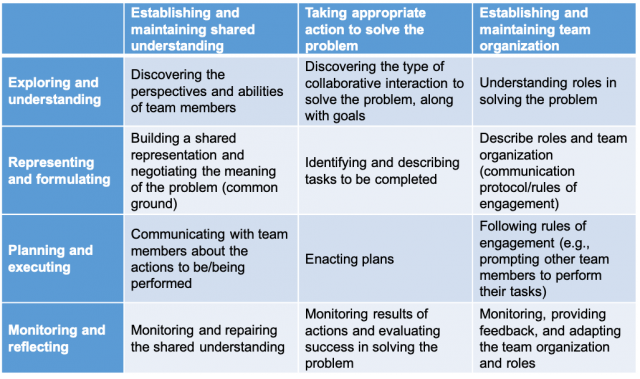
Skills for Collaborative Problem Solving
Yujiro Yamazaki
- Skills Needed in Labour Market and Issues Related to Skills of Workers
Programme for International Student Assessment (PISA), conducted by OECD countries for 15-year-old students, has been measuring collaborative problem-solving competency since 2015. Japan received a lot of attention for being ranked first in collaborative problem-solving competency.
Collaborative problem-solving competency is “the capacity of an individual to effectively engage in a process whereby two or more agents attempt to solve a problem by sharing the understanding and effort required to come to a solution and pooling their knowledge, skills, and efforts to reach that solution” (OECD 2013: 6). What skills are being measured in this collaborative problem-solving competency?
The PISA survey focuses on three competencies of collaborative problem solving: (1) “Establishing and maintaining shared understanding,” (2) “Taking appropriate action to solve the problem,” and (3) “Establishing and maintaining team organization.” The first, “Establishing and maintaining shared understanding,” is the ability to identify what each other knows about a problem and to build a standard view; the second, “Taking appropriate action to solve the problem,” is the ability to understand the constraints of a problem, to set team goals for solving it, to act on the issue, and to check the results. The third,” Establishing and maintaining team organization,” refers to the ability to understand the team’s roles, follow the rules of participation, and monitor the organization.
These three abilities are combined with the four cognitive processes of problem-solving: (1) “Exploring and understanding,” (2) “Representing and formulating,” (3) “Planning and executing,” and (4) “Monitoring and reflecting,” to establish 12 measurable skills (see table below).

While PISA identifies the necessary skills by subdividing collaborative problem-solving competencies into the 12 skills listed above, it also points out some challenges: PISA is not yet focused on continuous problem-solving processes, such as solving one problem and then discovering a new trial, due to the nature of PISA’s need to measure a set of issues that can be performed in a short period worldwide. Besides, collaborative problem solving has not yet been focused on (Shiramizu, Miyake, Masukawa 2014). It has also been pointed out that it is unclear whether collaborative problem solving refers to “the competence to share a problem that can be solved by anyone,” “the competence to work together to solve a problem that no one else can solve,” or “the competence to solve a problem that one cannot solve by oneself with the help of others” (Toyama, Shiramizu 2017)
IIt is indeed commendable that PISA has opened up a new way of looking at abilities that are difficult to measure, such as the ability to collaborate and solve problems, by subdividing them into 12 skills and measuring them. However, as Matsushita (2014) pointed out, it is crucial to tame PISA, which parses educational diversity into measurable indicators. It is better not to accept the 12 collaborative problem-solving skills uncritically but consider their limitations and areas for improvement.
(Yujiro Yamazaki)
References
OECD (2013). PISA 2012 Assessment and Analytical Framework: Mathematic, Reading, Science, Problem Solving and Financial Literacy,OECD Publishing, Paris.
OECD (2017), PISA 2015 Assessment and Analytical Framework: Science, Reading, Mathematic, Financial Literacy and Collaborative Problem Solving, revised edition, PISA, OECD Publishing, Paris.
白水始, 三宅ほなみ, 益川弘如 (2014) 「学習科学の新展開:学びの科学を実践学へ」『認知科学』, 21 (2), pp. 254-267.
遠山紗矢香、白水始 (2017) 「協調的問題解決能力をいかに評価するかー協調的問題解決過程の対話データを用いた横断分析―」『認知科学』, 24 (4), pp.-494-517.
松下佳代 (2014) 「PISAリテラシーを飼い慣らす―グローバルな機能的リテラシーとナショナルな教育内容―」『教育学研究』, 81(2), pp. 150-163.


